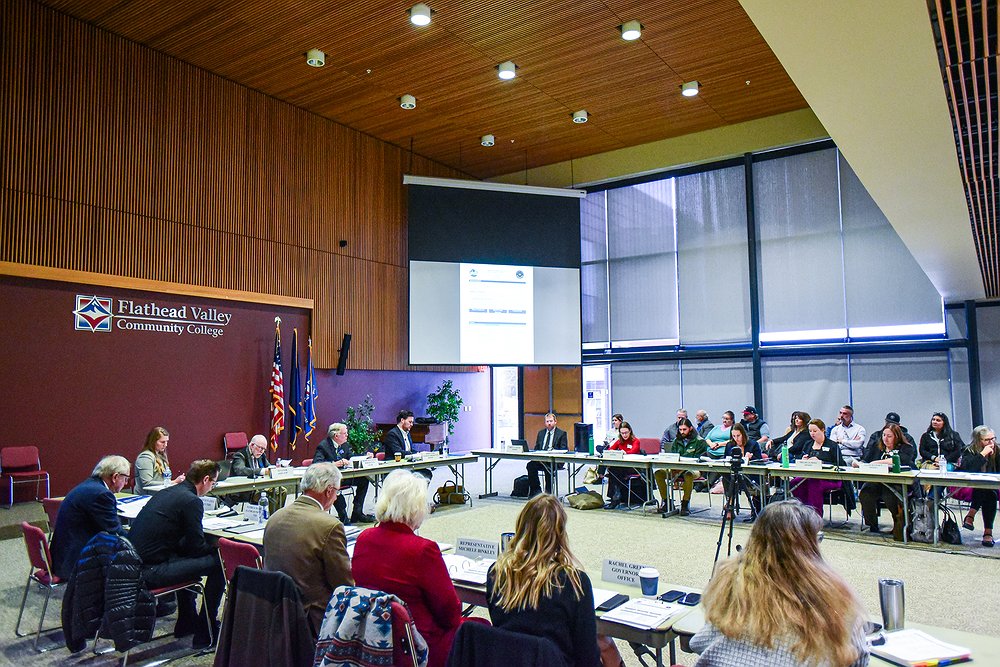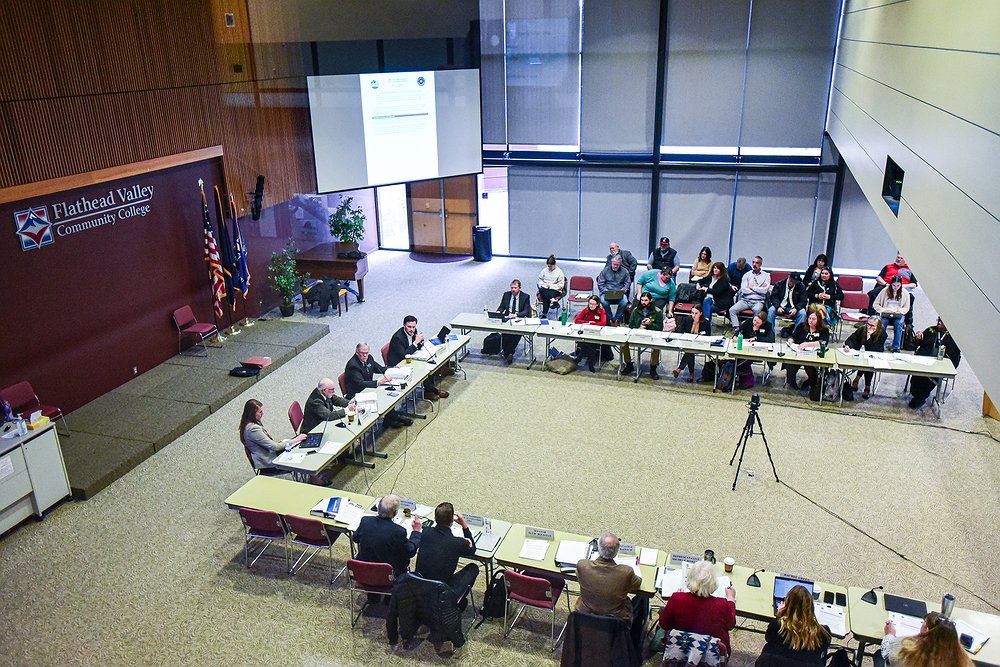Funding for mental health system revamp offers hope, but officials say solutions will take time
Barbara Hadley has shared her story at multiple community meetings on behavioral health in Northwest Montana, detailing her struggle to help a relative undergoing a severe mental health crisis — one that led to his eventual arrest and placement in county jail.
“He sat in there for at least six months … six months with no mental health care, nothing — as if he's a criminal,” Hadley said. “Granted, he did something and needs to be accountable for that. But I've been trying to get somebody to step in because it wasn't like a criminal mind. It's somebody who's sick.”
There are few options for people in Hadley’s position and she said she feels like she’s exhausted all avenues. Her relative is now in the state hospital awaiting an evaluation and his day in court.
But it’s even hard to get down there to see him, she said. The state hospital is located in Deer Lodge County, three-and-a-half hours away from her home.
“It's a long drive, I went up there last Sunday. I made an appointment for an hour visit for me and an hour visit for my chaplain. We got there at the time we had scheduled and they told us that we were going to only be allowed 15 minutes each because there was only half an hour total available,” Hadley said.
Hadley’s experience is one of many across Montana when it comes to navigating mental illness, whether it be for a loved one or themselves.
The Montana Legislature passed House Bill 872 in 2023, which aims to revamp the state’s behavioral health system with $300 million slated for initiatives, projects and facilities. According to the Montana Department for Health and Human Services, the legislation will “expand intensive and community-based behavioral health care and developmental disabilities services across Montana.”
The legislation established the Behavioral Health System for Future Generations Commission, which has hosted meetings across the state, honing in on different areas of focus. The commission will give its approval to initiatives that will be passed along to Gov. Greg Gianforte, who has the final say.
Rep. Bob Keenan, a Republican from Bigfork, took a spot on the commission after getting tapped by Gianforte to spearhead HB 872 during the 2023 legislative session. The legislation appropriated $70 million to be spent in the next few years, he said. That includes the use of $40 million in this biennium and another $30 million to be spent in the next biennium.
Another $75 million of the overall $300 million will move through a separate approval process, one involving legislative committees, before going to Gianforte’s office.
“That would be for more bricks and mortar, for building, remodeling and renovating,” Keenan said. “Which, you know, that might end up being what we do with the Western Montana Mental Health Center campus there in Kalispell, some of that money may be made available [for that.]”
The remainder of the $300 million, some $155 million, is not yet appropriated, Keenan said, but allocated for future use.
The $70 million poised to be expended in the next several years will be used to patch the system, according to Keenan. He said he hesitates to even call it a system because “it is so broken.”
MANY OF the issues surrounding Montana’s mental health care system stem from budget cuts made in 2017. Roughly $120 million was trimmed from the state's general fund following a special session of the state Legislature in an effort to avoid a budget deficit. The Department of Public Health and Human Services suffered cuts to the tune of nearly $50 million.
“Our initiatives coming back out of those were that we're helping providers that had closed down treatment facilities, whether that is … short term or more long term group homes and the like,” Keenan said.
Like Hadley’s relative, there are many people caught in the bottleneck of court-ordered evaluations, Keenan said.
“Because those are done in one location, about five miles from Warm Springs in the Galen facility, which is just a few miles from the state hospital … that's the only place we're getting fitness to proceed,” Keenan said. “We have like 53 to 54 beds down there, six are for women, the rest are for men. There's a nine-month waiting list. Well, what happens obviously is that backs up to the local county detention center, and then we end up with people that are not fit to proceed.”
Two near term initiatives, or NTIs, have already been approved by Gianforte. These include grants to incentivize community-based, court-ordered evaluations and grants to increase residential bed capacity, a total investment of about $17.5 million.
The former grants would be used to provide 24-month pilot grants to counties from HB 872 funds, finance completion of in-facility, court-ordered fitness-to-proceed evaluations as well as associated stabilization services, and using on-site and/or telehealth psychiatric services for those individuals deemed unable to regain fitness, according to state health officials.
Grants to increase bed capacity would provide one-time funding to congregate community living providers who serve people with serious mental health or developmental disabilities. These monies could be used to secure a new facility, address existing facility upgrades and maintenance, hire and train staff, and as revenue supplementation.
Keenan believes the grants for increased bed capacity will have a positive effect on communities in need of expanded or new facilities. He said he recently met with Flathead County commissioners and that they plan to apply for the grant to potentially aid in reopening Glacier House, a shuttered 24-hour crisis receiving center in Kalispell formerly operated by Western Montana Mental Health Clinic.
AT A Nov. 30 meeting in Kalispell, members of the state behavioral health commission heard proposals related to the mobile crisis response team program, which is active in Montana's urban centers and sends social workers out alongside first responders attending to people in mental health crises. They approved two NTI proposals that will give grants to support mobile crisis response teams as well as an initiative for certification and curriculum development. Keenan said he and his colleagues expect these to receive the governor’s approval.
Flathead County Co-Responder Crisis Therapist Sarah Winfrey spoke at the commission meeting in Kalispell, saying that the state should provide consistent additional financial support for crisis mental health programs.
In an email response to the Daily Inter Lake, Winfrey said she believes the Crisis Assistance Team program, or CAT, has been going well. The program has been housed under various agencies and was most recently taken on by the county. She said they have had 398 contacts with people in crisis so far this year.
“I think that being embedded with law enforcement has been such a benefit. I also am available to assist the numerous fire departments throughout the county on crisis calls and we all just work together to help people and keep people safe,” Winfrey said.
Finding a second co-responder to shoulder the workload has proved challenging, she said. And there are more questions on the horizon, as the program will no longer be funded solely through grants, but is moving in the direction of being supported by Medicaid reimbursements as of Jan. 1. Winfrey said she believes the statewide program cannot sustain itself on these reimbursements alone, which is why she asked the commission to consider more long-term funding avenues.
When it comes to the program in Flathead County, she said they get a lot of support from local municipalities and the community at large. Roughly $100,000 given to the city of Kalispell from a nationwide opioid settlement has been routed to the program, a recurring funding source that Winfrey said will help support it through the Medicaid transition.
Medicaid reimbursement would fund the program based on how many calls she attends to, which she said isn’t consistent enough for the work they do.
“Some weeks I'll go on just four calls, some weeks it's 15 calls. It's truly another emergency responder branch that needs constant financial support and can't be supported by the call volume alone. Just imagine the fire department or police department being only funded by their call volumes,” Winfrey said.
Winfrey has a wish list of mental health resources in the area, which include reopening mental health crisis stabilization facilities for both adults and juveniles, a drop-in center, a detox center located out of town and a rural bus service for people who need to reach services in town.
These are goals that could be addressed through the funding provided by HB 872, though it will take time.
WHITEFISH REP. Dave Fern, a Democrat, said the NTIs presented by the commission, of which he is a member, are likely to all make the cut, as they are offered at “an extraordinarily reasonable” expense. He gave the example of the mobile crisis response unit grants being funded at $7.5 million.
“I’m pretty optimistic; we will not be asking for unreasonable things, it’s pretty targeted,” Fern said. “I'm hoping we'll hit a home run and we'll get all our requests approved and look at another round for 2024 and beyond.”
Fern said his goal for the commission is to outline opportunities for long-term funding. This includes looking at Medicaid reimbursement and Medicaid expansion.
“In order to have a partnership with our third-party providers, I think there has to be a degree of confidence from them that if they set up shop here, there'll be a reimbursement, at least a realistic and livable reimbursement,” Fern said.
He said working on the commission has been one of his better experiences in the Legislature, adding that it’s a body where the relationships are honest and respectful. He said the Department of Public Health and Human Services is transparent about the needs within the system and the problems officials and employees have encountered over the years.
“I think [it’s] because we all have either experienced a degree of mental illness or we have family or close friends who have, and seen tragic encounters in our own communities. So it's a very relatable topic,” Fern said. “From the political arena, it's a good one to be working on. So, long-term funding and having enough folks to hire, I think, are key issues here and what I'm hoping we can address moving forward.”
Keenan is committed to seeing conditions improve for people in Montana living with mental health issues.
“You know, we're not going to reinvent the world, we're not going to be able to fix everything, but we can begin the process,” Keenan said.
For Winfrey, she hopes that the CAT program will continue to expand its purview in its mission to help the community. The job encompasses what social work is, providing micro and macro level services to community members, and following up with resources, she said.
“This is an incredibly dynamic job, where I might spend my day driving across the county from Columbia Falls to Lakeside assisting with the de-escalation of people in crisis,” Winfrey said. “I love my job and I'm so excited for the day that it is fully staffed and really rooted in the community that I love and care for.”
Reporter Taylor Inman can be reached at 406-758-4433 or by emailing tinman@dailyinterlake.com.








